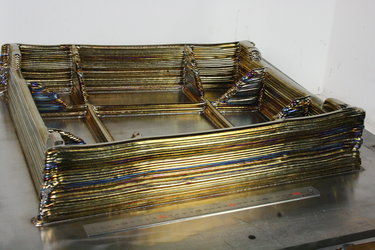Accept all cookies Accept only essential cookies See our Cookie Notice

About ESA
The European Space Agency (ESA) is Europe’s gateway to space. Its mission is to shape the development of Europe’s space capability and ensure that investment in space continues to deliver benefits to the citizens of Europe and the world.
Highlights
ESA - United space in Europe
This is ESA ESA facts Member States & Cooperating States Funding Director General Top management For Member State Delegations European vision European Space Policy ESA & EU Space Councils Responsibility & Sustainability Annual Report Calendar of meetings Corporate newsEstablishments & sites
ESA Headquarters ESA ESTEC ESA ESOC ESA ESRIN ESA EAC ESA ESAC Europe's Spaceport ESA ESEC ESA ECSAT Brussels Office Washington OfficeWorking with ESA
Business with ESA ESA Commercialisation Gateway Law at ESA Careers Cyber resilience at ESA IT at ESA Newsroom Partnerships Merchandising Licence Education Open Space Innovation Platform Integrity and Reporting Administrative Tribunal Health and SafetyMore about ESA
History ESA Historical Archives Exhibitions Publications Art & Culture ESA Merchandise Kids Diversity ESA Brand CentreLatest
Space in Member States
Find out more about space activities in our 23 Member States, and understand how ESA works together with their national agencies, institutions and organisations.
Science & Exploration
Exploring our Solar System and unlocking the secrets of the Universe
Go to topicAstronauts
Missions
Juice Euclid Webb Solar Orbiter BepiColombo Gaia ExoMars Cheops Exoplanet missions More missionsActivities
International Space Station Orion service module Gateway Concordia Caves & Pangaea BenefitsLatest
Space Safety
Protecting life and infrastructure on Earth and in orbit
Go to topicAsteroids
Asteroids and Planetary Defence Asteroid danger explained Flyeye telescope: asteroid detection Hera mission: asteroid deflection Near-Earth Object Coordination CentreSpace junk
About space debris Space debris by the numbers Space Environment Report In space refuelling, refurbishing and removingSafety from space
Clean Space ecodesign Zero Debris Technologies Space for Earth Supporting Sustainable DevelopmentLatest
Applications
Using space to benefit citizens and meet future challenges on Earth
Go to topicObserving the Earth
Observing the Earth Future EO Copernicus Meteorology Space for our climate Satellite missionsCommercialisation
ESA Commercialisation Gateway Open Space Innovation Platform Business Incubation ESA Space SolutionsLatest
Enabling & Support
Making space accessible and developing the technologies for the future
Go to topicBuilding missions
Space Engineering and Technology Test centre Laboratories Concurrent Design Facility Preparing for the future Shaping the Future Discovery and Preparation Advanced Concepts TeamSpace transportation
Space Transportation Ariane Vega Space Rider Future space transportation Boost! Europe's Spaceport Launches from Europe's Spaceport from 2012Latest

From waste to worth – 3D printing on Mars
Thank you for liking
You have already liked this page, you can only like it once!
For long-term stays on Mars, astronauts would need facilities to live and work, to move around, to communicate with Earth, and to produce oxygen and water vital for survival. Taking all this infrastructure from Earth would be very expensive. Instead, ESA is thinking about how to 3D print some of it on site using Martian soil as an input material.
Previous ESA-funded research has shown that this would be possible. The next step is being undertaken by Austrian research group FOTEC, in a research activity that is aiming to better understand the effect of the Martian environment on construction materials and processes. The research team is also looking at recycling waste into new materials; this waste could come from equipment brought from Earth and not used anymore, for example plastic food packaging.
Advenit Makaya, advanced manufacturing engineer at ESA explains: "This activity is part of ESA's continuous effort to identify and develop technologies to use onsite resources to help build and maintain the required infrastructure and ensure the sustainability of future long-term exploration missions."
In particular, FOTEC is building upon a previous ESA activity focusing on building on Mars using Martian soil. Using the knowledge gained in years since the activity completed, they will introduce novel processing techniques to improve the performance of the building material.
Markus Hatzenbichler, Head of Engineering Technologies at FOTEC expands: "The investigation into waste recycling, including using waste as a binding agent, is an important part of this activity. Whilst the main goal is to support the preparation of future missions to Mars, in the shorter term the results may support our understanding of insulation and structural integrity in the field of civil engineering."
-
CREDIT
FOTEC / ESA -
LICENCE
ESA Standard Licence

3D printed Mars simulant

Face the virus

3D-printed aeronautics demonstrator

Amaze















 Germany
Germany
 Austria
Austria
 Belgium
Belgium
 Denmark
Denmark
 Spain
Spain
 Estonia
Estonia
 Finland
Finland
 France
France
 Greece
Greece
 Hungary
Hungary
 Ireland
Ireland
 Italy
Italy
 Luxembourg
Luxembourg
 Norway
Norway
 The Netherlands
The Netherlands
 Poland
Poland
 Portugal
Portugal
 Czechia
Czechia
 Romania
Romania
 United Kingdom
United Kingdom
 Slovenia
Slovenia
 Sweden
Sweden
 Switzerland
Switzerland






















